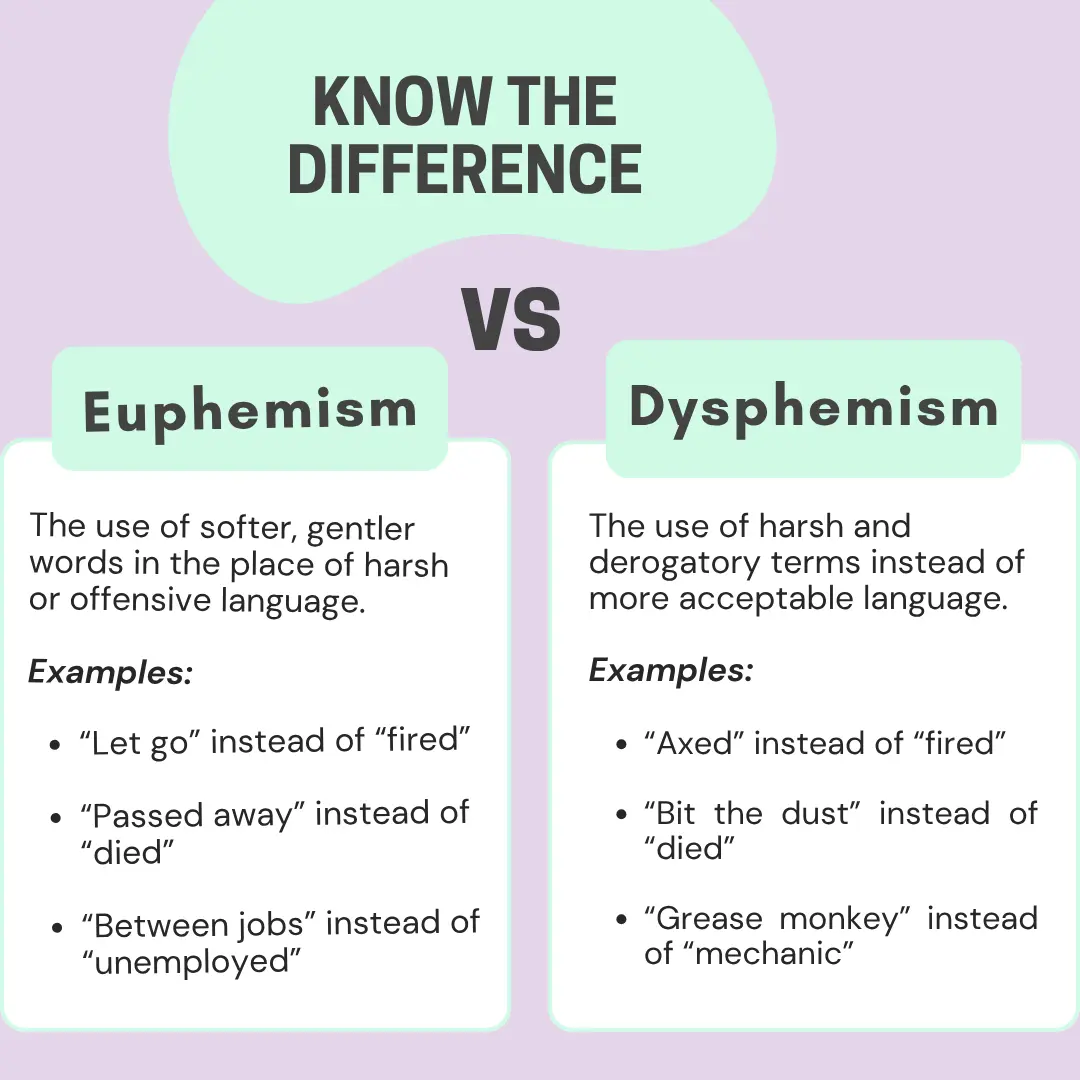What’s a euphemism?
Have you ever heard people use phrases like let go when what they really mean to say is that someone was fired?
To use spin the truth instead of lie, describing someone as vertically challenged as opposed to lie. —these words and phrases are a literary technique known as a euphemism (pronounced you-fuh-mism).
Dictionary definitions for euphemism
From the Greek word meaning “to use words of good omen,” euphemism is the substitution of a pleasant term for a blunt one—telling it like it isn’t.—Nation: The Euphemism, "Telling it Like it Isn't"
For the formal definition: [euphemisms] are a literary technique which uses "an innocuous word or expression in place of one that is deemed offensive or suggests something unpleasant".
Collins Dictionary defines it as: “a polite word or expression … to refer to things which people may find upsetting or embarrassing to talk about, for example sex, the human body, or death”.
Merriam-Webster on euphemism: “the substitution of an agreeable or inoffensive expression for one that may offend or suggest something unpleasant”.
Oxford Learner’s Dictionary,
An indirect word or phrase that people often use to refer to something embarrassing or unpleasant, sometimes to make it seem more acceptable than it really is . . . ‘downsizing’ as a euphemism for cuts.
Euphemism vs. understatement
Understatements are distinct from euphemisms, though they are related ideas that sometimes overlap. An understatement is another literary technique which deliberately "under-states", or downplays the significance of something, often to induce humour or add emphasis.
An example of an understatement would be if someone were to say, "we got a bit of rain today", after a huge, news-worthy storm. A euphemism, which replaces harsher words with softer ones, are not attempts to downplay or minimize something's significance.
Rather, when people use euphemisms, they may do so to avoid the discomfort that surrounds a particular topic, or to use more socially agreeable wording. We usually see euphemisms around certain "taboo" subjects to make them more acceptable in conversation, especially regarding death, money, sex, or politics.
Dysphemism vs. euphemism

Dysphemism (dis-fuh-mism) uses offensive or derogatory language instead of neutral or acceptable terms. Examples of dysphemisms include describing death as someone having "bit the dust", "croaked", or "kicked the bucket". A euphemism is the precise opposite of dysphemism.
Other examples of dysphemisms:
- For a police officer: "pig" or "popo"
- For a psychologist: "shrink" or "head shrinker"
- For a messy home: "dump"
- For a doctor (suspected of incompetence): "quack"
- For someone who informs on others: "snitch"
- For a lawyer: "ambulance chaser" or "bag man"
- For a rural area: "the boonies" or "boondocks"
Common examples of euphemisms
- “Let go” instead of “fired”
- “Bit the dust” instead of “died”
- “Big boned” instead of “fat”
- “Darn” instead of “damn”
- “Spin the truth” instead of “lie”
- “Unique looking” instead of “ugly”
- “Stepping out” instead of “cheating”
Synonyms for euphemism
Synonyms for euphemism
Quotes “euphemism”
If you are "let go," "separated," "terminated" or whatever euphemism the company uses for "clean-out-your-desk-and-be-gone," remember that you do have rights.
—Elsie Maclay, First for Women, July 1989
Spin is sometimes dismissed as a simple euphemism for lying. But it's actually something more insidious: indifference to the truth.
—Michael Kinsley, Time, 25 Dec. 2000–1 Jan. 2001
I would rather you say what you mean than resort to euphemism.
On a larger scale, though, the persistent growth of euphemism in a language represents a danger to thought and action, since its fundamental intent is to deceive. Nation: THE EUPHEMISM: TELLING IT LIKE IT ISN'T
Origin of the word euphemism
1650s, from Greek euphemismos “use of a favorable word in place of an inauspicious one, superstitious avoidance of words of ill-omen during religious ceremonies,” also of substitutions such as Eumenides for the Furies. This is from euphemizein “speak with fair words, use words of good omen”.
FAQs
What is a euphemism?
Why use euphemisms?
What is the origin of euphemism?
Give some examples of euphemisms.
What are synonyms for euphemism?
Sources
-
"Nation: THE EUPHEMISM: TELLING IT LIKE IT ISN’T." TIME, 19 Sept. 1969, https://time.com/archive/6637533/nation-the-euphemism-telling-it-like-it-isnt/. Accessed 19 Aug. 2025.
-
“Genteelism, N.” Oxford English Dictionary, Oxford UP, December 2024, https://doi.org/10.1093/OED/2342325056.
Advertisement








.webp&w=3840&q=75&dpl=dpl_13tcGbrn5BXPQFsQmuQWqib9Y3DN)